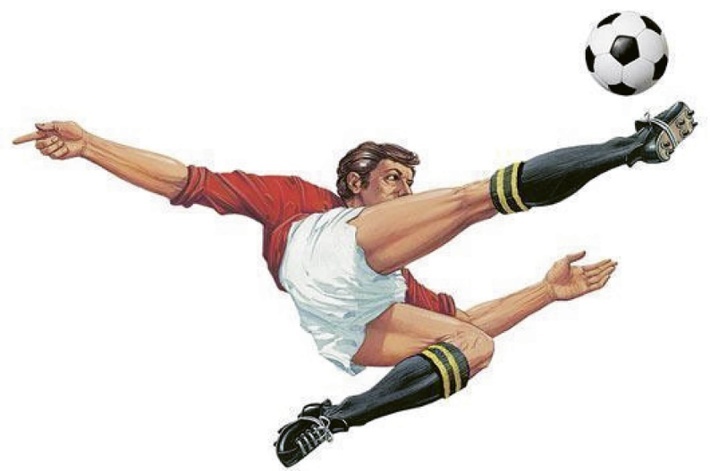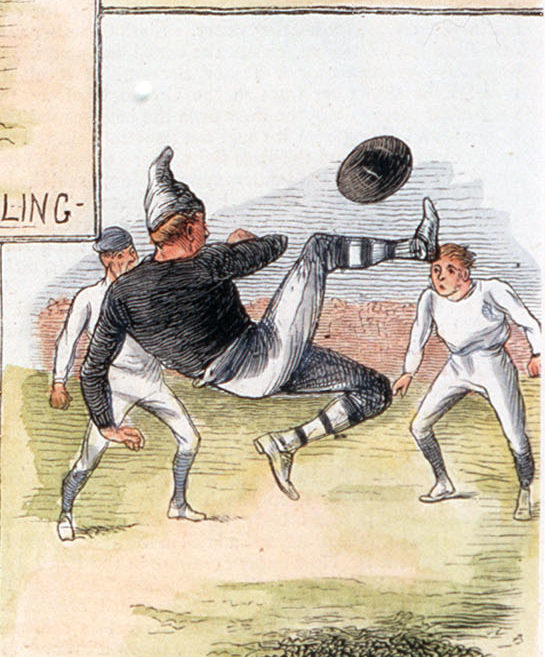
IT has become one of the most iconic images in football.
The footballer performing a spectacular overhead kick is the famous logo of the Panini sticker albums, known to generations of children and their parents around the world.
The player is Carlo Parola, an Italian star dubbed the father of the bicycle kick and nicknamed the Man of Glasgow after starring in a famous post-war match at Hampden.
But new research by football historians suggests Juventus defender Parola was actually following a pioneering up in the air Scot.
Richard McBrearty, the curator of the SFA museum, said: “There’s no doubt Carlo Parola has a strong connection with the bicycle kick.
“Unlike today, it was relatively unusual to do in those days and according to sources, he was quite fond of doing them.
“The image of him doing it for Juventus in a game in 1950 is iconic and anyone who has collected a Panini album in the past will be very familiar with it. But it’s not true that he invented it.
“It’s something Scotland has a strong claim on inventing long before people like Parola came along.”
Parola, who began his long and illustrious career in the 1930s, is one of a number of players who have been credited with inventing the athletic move.
In Italy, he is still dubbed Signor Rovesciata, or Mr Bicycle Kick, in a career that spanned three decades and was rudely interrupted by the Second World War.
Other claims to having invented the signature move originate in South America with it known as a Brazilian kick in Norway.
But according to contemporary newspaper accounts at the SFA museum in Glasgow, the bicycle kick was first seen at the world’s first international match in 1872.
And while there was no photographer there to capture the image like Parola, artist William Ralston was on hand to jot down the image for illustrated newspaper The Graphic.
Entitled “Well done Mac” the image of Scottish player Billy MacKinnon showing off his athletic prowess could well be the first example of a bicycle kick.
The newspaper said: “The sketch ‘Well done, Mac’ our artist observes, looked very exaggerated, but is true to fact.
“It was the kick of the day.
“Mackinnon was on the bound higher than his head (he is not very tall), when he leapt up, and to the surprise of his opponents, who was waiting till the ball came over, Mackinnon kicked it well up hill.
“Of course the player, who was lustily applauded, came down flat on his back.”
Almost seven decades later the elegant Carlo Parola was making it his trademark.
And that included in a match when he took the export home to Scotland.
The Juventus legend shot to fame when he starred for a European select against their British contemporaries in Glasgow in an exhibition match in 1947.
At the time, Hampden was the biggest stadium in the world with over 137,000 spectators cramming in to see Parola and co get annihilated 6-1 by their opponents in the game dubbed “Match of the Century”.
Despite the drubbing, and scoring an own goal, Parola did a number of his signature moves and later insisted he had played well despite the result.
Mr McBrearty said: “For a lot of people that will have been the first time they will have seen anything like a bicycle kick. It would still be rare. Football wasn’t televised, so seeing games live was the only way to watch it.”
The Scottish match had a massive impact on Parola.
He later described the atmosphere as the greatest he’d ever experienced with him dubbed the Man of Glasgow in one moving Italian obituary when he died in 2000.
Nowadays Parola is just as famed for his connection to Panini sticker albums as he is for his pioneering moves.
But experts say he’d like the fact his famed move originated in Scotland.
Italian football journalist Massimilliano Vitelli, who writes for Il Tempo and contributes to The Sunday Post, said: “He was undoubtedly very proud of being involved in the game in Glasgow. Almost as much as his trademark bicycle kick.”
Fabrizio Melegari, of Panini, said: “The magical moment of aesthetic perfection from Carlo Parola inspired the founder of our firm Giuseppe Panini.”

Enjoy the convenience of having The Sunday Post delivered as a digital ePaper straight to your smartphone, tablet or computer.
Subscribe for only £5.49 a month and enjoy all the benefits of the printed paper as a digital replica.
Subscribe
